What is The Best CFD Trading Platform in 2026? Broker’s Guide

For brokers and individual traders, choosing the best CFD trading platform is very important. A poor choice means you’re at a disadvantage. It affects your trading speed, your risk management, and your final profits.
The good CFD trading platform options offer more than a nice design. They have effective tools, execute trades smoothly, include good risk controls, and are easy to use. The right platform matters a lot—for beginners needing guidance, and for experts using fast, multi-asset trading platform strategies.
In this guide, we will look at the core features of the best platforms, the actual benefits, and which platforms perform well in CFD trading.
Key Takeaways
- CFD trading platforms allow traders to speculate on price movements across many markets: FX, stocks, indices, commodities, and crypto, without asset ownership.
- The best CFD trading platform options provide broad market access, real-time data, effective charting tools, and efficient trade execution.
- The best platform for CFD trading meets diverse trader requirements by offering multi asset trading platform support, high-speed execution, and useful educational resources for various experience levels.
What Is a CFD Trading Platform?
A good CFD trading platform is a trader’s central workspace. Such platform provides access to global markets and a wide range of tradable instruments, essential analytical tools like comprehensive charts, technical indicators, and real-time data, and more. All of this is necessary for informed analysis.
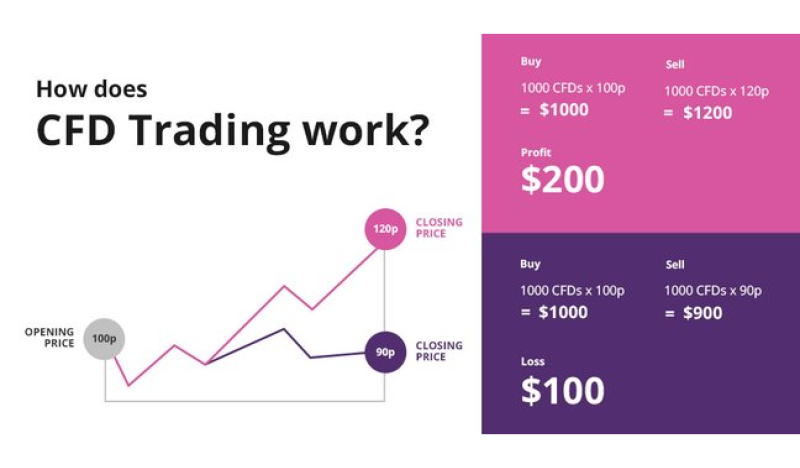
Many platforms furnish additional information resources—economic calendars, news feeds, sentiment indicators—to prevent traders from being caught unprepared by unexpected market-moving events. This aids in making more informed judgments and refining trading plans.
More than just market analysis, a good CFD trading platform must be user-friendly. Customisable dashboards, one-click trading capability, and reliable mobile compatibility contribute to this. Such features help traders operate with precision and monitor their positions without undue complication.
Speed is paramount. These platforms employ advanced CFD trading technology and process trades instantaneously, with minimal delay. Because in volatile markets, big latency can severely damage an account.
CFD trading platforms allow traders to speculate on financial instruments in financial markets without owning assets.
Key Features of the CFD Trading Platform
To achieve success in CFD trading, a professional platform is fundamental. It must provide the essential tools and features that enable traders to make informed decisions and manage their positions with precision. So, what defines a truly high-quality best CFD trading platform, beyond superficial appeal?
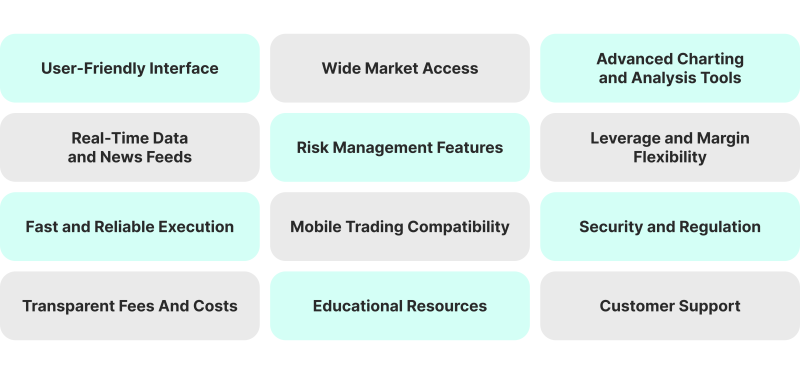
User-Friendly Interface
If a platform is not intuitive, its advanced features offer little value. It must be straightforward for beginners yet allow extensive customization for experienced traders. Key aspects include configurable layouts, one-click trading functionality, and clear navigation. The focus should be on market analysis and execution, not on deciphering the platform itself.
Wide Market Access
A quality CFD trading platform should provide unrestricted market access. It must offer a comprehensive selection of tradable instruments across global markets – Forex, equities, commodities, and cryptocurrencies. This capability is important.
It facilitates portfolio diversification and allows traders to pursue opportunities in various asset classes as market conditions evolve. Not concentrating capital in a single area is a fundamental risk management principle.
Advanced Charting and Analysis Tools
If a platform’s charting capabilities are rudimentary, a trader is at a disadvantage. High-quality, interactive charts are essential. A comprehensive arsenal of technical indicators—such as MACD, RSI, and Bollinger Bands—is also required.
Furthermore, functional drawing tools are necessary. These are not aesthetic features; they are critical analytical instruments for dissecting price action and identifying trading opportunities.
Real-Time Data and News Feeds
Trading based on outdated information or delayed price quotes is untenable. Access to live, real-time data is a prerequisite for informed trading. A reputable platform will also integrate relevant news feeds directly.
Why is this critical? Because market-moving information, such as central bank announcements or key economic data releases, can impact prices instantaneously. Timely awareness is crucial.
Risk Management Features
This is where inexperienced traders often falter. Risk management is not optional; it is essential for long-term viability. Your CFD trading platform must provide fundamental risk control tools: stop-loss orders to limit downside, take-profit orders to secure gains, and ideally, trailing stops. These features are not superfluous; they are critical for capital preservation.
Have a Question About Your Brokerage Setup?
Our team is here to guide you — whether you're starting out or expanding.
Leverage and Margin Flexibility
Leverage is a defining, yet potent, characteristic of CFD trading. It allows traders to control larger positions with a smaller capital outlay, amplifying potential returns. However, it equally magnifies potential losses.
A quality platform will offer flexible dynamic leverage settings, not a rigid approach. Critically, it must provide completely transparent margin requirements so traders understand their exposure and the conditions for a margin call.
Fast and Reliable Execution
In rapidly moving markets, platform execution speed is non-negotiable. Trades must be processed instantaneously. There can be no significant delays. If an order is filled at a price different from the one clicked due to platform latency—this is slippage—it directly erodes potential profits. This is especially true in volatile conditions. The cfd trading software must perform reliably.
Mobile Trading Compatibility
It is a reality that traders are no longer exclusively desk-bound. If a platform lacks a comprehensive mobile application with full feature parity to its desktop version, it is outdated. Traders require the ability to monitor positions, execute trades, and respond to market events from their mobile devices, without compromise.
Security and Regulation
The security of user funds and data is paramount. A trusted platform will be operated by a regulated broker adhering to stringent financial industry standards. Furthermore, it must employ robust encryption technologies to protect sensitive information.
Transparent Fees and Costs
Undisclosed fees can materially erode profitability. A reputable platform will maintain full transparency regarding its cost structure. This includes clearly stating spreads, commissions, and any applicable overnight financing charges.
Educational Resources
Many platforms offer educational materials such as tutorials, webinars, and trading guides. These resources can help traders develop their skills and knowledge. This is especially valuable for beginners seeking to establish a solid understanding of CFD trading strategies.
Customer Support
When issues arise, responsive customer support is crucial. A quality platform will provide accessible and effective support channels—such as live chat, email, or telephone—to ensure timely resolution of any problems or questions.
Areas of CFD Trading Platforms Usage
So, what are the primary applications for a CFD trading platform? They serve various functions beyond simple order placement. Here are the key areas of use:
Speculation on Price Movements
Let’s be direct: a primary use is for speculation. If a trader believes an asset’s price will rise, they can buy a CFD. If they believe it will fall, they can short a CFD. There is no purchase of the underlying physical asset or security; it is purely a leveraged position on price direction. This method is efficient and allows participation in both rising and falling markets without the complexities of direct ownership.
Accessing Diverse Markets
A key advantage of a quality CFD trading platform is its provision of access to global markets. Traders are not confined to domestic equities. They can seamlessly speculate on Forex pairs, individual company stocks, broad market indices like the S&P 500, commodities such as gold, or cryptocurrencies like Bitcoin, all from a single interface. This provides the flexibility to pursue diverse opportunities and can aid in portfolio risk diversification.
Leveraged Trading
A core feature is leverage. CFD trading is inherently leveraged. This allows a trader to control a substantial position in an asset with a relatively small amount of initial capital. The potential is to amplify a small favorable market movement into a significant profit. However, leverage also proportionally amplifies losses. Therefore, while dynamic leverage offers opportunities, it demands rigorous risk management.
Hedging Existing Positions
CFDs also serve as effective hedging instruments. Institutional investors and private traders alike use them to manage risk in existing portfolios. For example, an investor holding a substantial equity portfolio who anticipates a market correction can, instead of liquidating assets, short-sell an appropriate index CFD or individual stock CFDs. Should the market decline, gains from the CFD positions can help offset losses in the underlying portfolio.
Short-Term Trading Strategies
These platforms are well-suited for high-frequency and short-term CFD trading strategies. Scalpers aim to profit from very small price changes, often executing numerous trades within minutes. Day traders seek to capitalize on intraday price movements, closing all positions before the market ends. CFDs are advantageous for these approaches due to typically fast execution speeds and competitive spreads, with no concern for long-term asset ownership.
Long-Term Position Management
It is a common misconception that CFDs are exclusively for short-term trading. This is incorrect. They can also be effectively used for managing long-term positions. A CFD trading platform provides the necessary analytical tools, position tracking, and risk management features to support strategies based on broader market trends that unfold over weeks, months, or longer.
Top CFD Trading Platforms
Let’s review some notable platforms available, each designed to cater to different trading styles and preferences.
B2TRADER
Developed by B2BROKER, B2TRADER targets professional clients such as Forex and cryptocurrency brokers, and financial institutions. It is engineered as a robust multi asset trading platform, designed to manage diverse instruments efficiently.
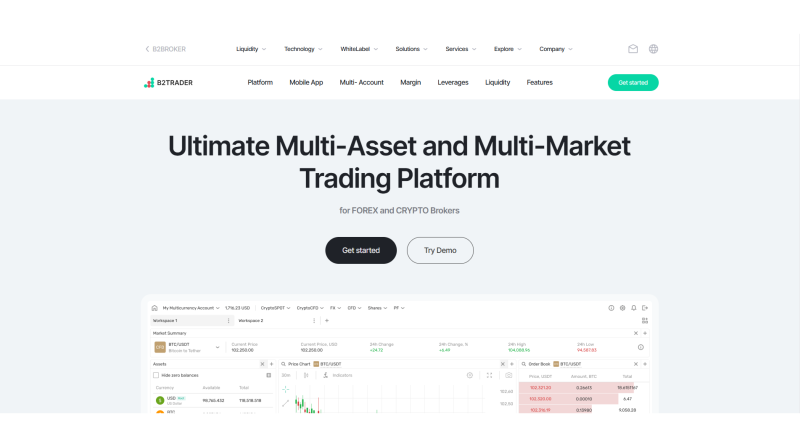
Its primary advantage is direct access to leading CFD liquidity sources. This is intended to provide a stable and deep pool of liquidity, which is essential for institutional-scale trading and for maintaining high-quality CFD trading technology. The focus is on ensuring smooth operational flow for significant capital.
eToro
eToro has established significant brand recognition, largely through its social trading functionalities. The “CopyTrader” feature is central to its offering, permitting users to mirror the investment strategies of selected traders on the platform. Market access is comprehensive, covering equities, indices, Forex, and cryptocurrencies.
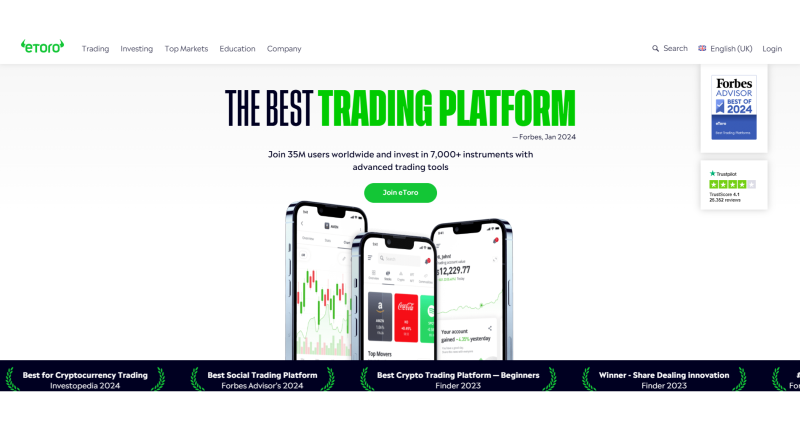
The platform is simple to use. Its web and mobile interfaces are designed with user-friendliness in mind. Furthermore, the commission-free trading offered on stock CFDs is a notable attraction for novice traders.
Plus500
Plus500‘s primary emphasis is on rapid and efficient trade execution. The platform provides access to a wide array of over 2,000 financial instruments, which includes stocks, Forex, indices, and commodities.
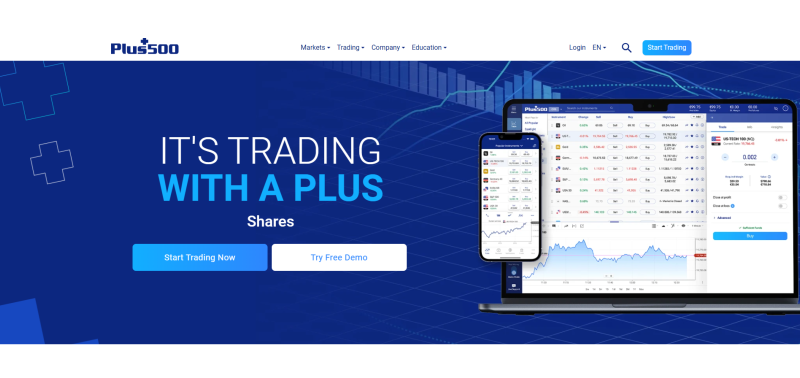
The company highlights its competitive spreads and the absence of direct trading commissions; however, traders should always examine the complete fee structure. On a positive note, it offers practical risk management features, such as guaranteed stop-loss orders. Its mobile application is designed for straightforward functionality, appealing to users who prefer less complex interfaces.
IG
IG is an established broker in this field, notable for its extensive market offering of over 17,000 tradable instruments. This breadth indicates the platform is designed for traders seeking a comprehensive and robust trading environment.
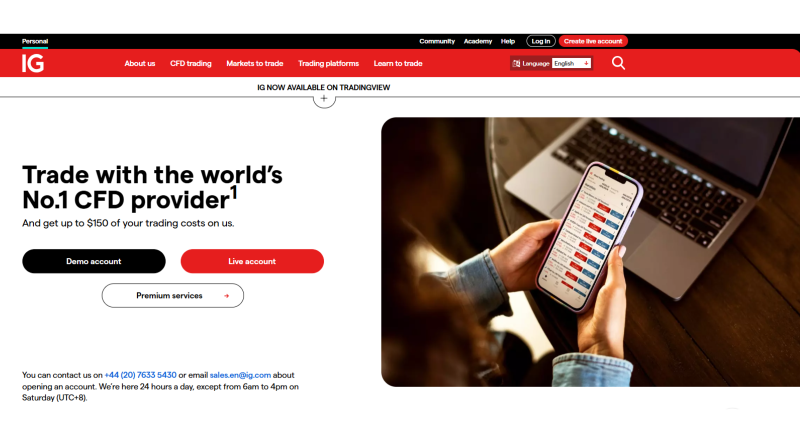
It provides advanced charting capabilities, including access to specialized software such as ProRealTime. Furthermore, IG offers substantial educational resources suitable for a wide range of trader experience levels. Regulation by multiple leading financial authorities contributes to its secure operational framework. This platform is often considered by sophisticated traders who require advanced tools and extensive market access, placing it among candidates for the best platform for CFD trading.
CMC Markets
CMC Markets is a robust CFD trading platform for novice and experienced investors. It gives access to a wide range of over 10,000 products to trade, including share CFDs, Forex, and commodities.
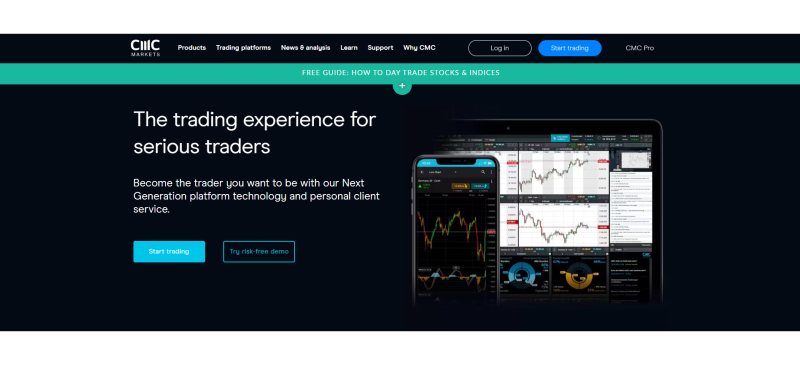
It has its “Next Generation” trading platform, offering sophisticated charting and customisation. With free content that is informative in nature, transparent pricing, and competitive spreads, CMC Markets is a top option for those looking to access sophisticated features and market analysis tools.
B2TRADER — What Makes It An Outstanding CFD Platform Provider?
B2TRADER is a CFD trading software created by the FinTech solution pioneer, B2BROKER. The platform is suitable for brokers and exchanges of all sizes, providing high-performance execution, scalable features, and feature-rich trading services.
Discover the Tools That Power 500+ Brokerages
Explore our complete ecosystem — from liquidity to CRM to trading infrastructure.
The B2TRADER platform is renowned for its solid infrastructure, offering all the necessary tools and technology to facilitate CFD trading with high flexibility and efficiency. Here’s a quick review of its key features:
Multi-Asset & Multi-Market Trading
Brokers can offer seamless trading of Crypto Spot, CFDs, and Forex through a single account. Alternatively, brokers can manage spot and derivative markets with segmented accounts on a scalable, cost-effective platform.
Unparalleled Performance
The platform processes up to 3,000 requests per second for instant execution during high volatility. Built for scalability, it ensures low-latency market access for an enhanced trading experience.
Cross-Margin Collateral Management
Customisable collateral limits and multi-currency support optimise risk and capital efficiency. Brokers can adjust margins dynamically in real-time, adapting to market conditions.
Dynamic Leverage Options
Brokers can set leverage ratios for different client profiles. Automatic adjustments during market swings mitigate risks, while scalable margins adapt to assets and trading volumes.
Smart Cross-Rate Tree Technology
Users can trade nearly any CFD pair, including exotic pairs, with optimal pricing and instant execution. Real-time price updates ensure accuracy, while advanced algorithms optimise trade efficiency.
Liquidity Agnostic Integration
B2TRADER Integrates seamlessly with leading liquidity providers and crypto exchanges. The platform ensures uninterrupted trading flow and customisable liquidity pools to match broker and client needs.
Mobile App Accessibility
Trading on the go with a feature-rich mobile app is also possible. B2TRADER mobile apps offer real-time access, portfolio management, and seamless sync with desktop platforms. Advanced tools and notifications enhance convenience and engagement.
Conclusion
Selecting the right CFD trading platform is critical to success in today’s fast-paced financial markets. Platforms like B2TRADER, eToro, and IG exemplify the blend of innovation, reliability, and functionality needed to cater to diverse trading strategies and preferences. Whether you are an individual trader looking for a user-friendly platform or a brokerage aiming to deliver multi-asset trading capabilities, the options are vast and varied.
As markets evolve, adapting to new trends and technologies will remain paramount. With platforms offering features like seamless liquidity integration, multi-asset support, and advanced automation, traders and brokers are well-equipped to navigate the complexities of modern financial markets and achieve sustainable growth.
FAQ
What should I look for in a CFD trading platform?
Look for features such as access to diverse markets, user-friendly interfaces, advanced charting tools, risk management features, and fast execution speeds.
What types of assets can I trade on a CFD platform?
CFD platforms typically offer various assets, including Forex, stocks, indices, commodities, and cryptocurrencies.
How do fees impact my CFD trading?
Fees such as spreads, commissions, and overnight financing charges can significantly impact profitability. To optimise your trading outcomes, choose a platform with competitive and transparent pricing.
Recommended articles

26.01.23






